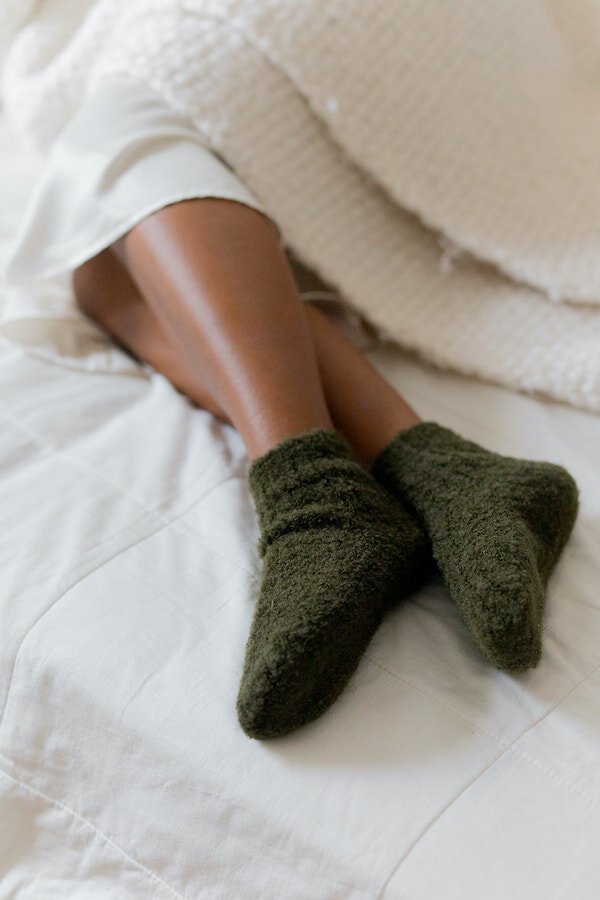
How To *Actually* Get Some Rest
Almost everyone I know is waking up tired.
The days are getting shorter, the list of news headlines is getting longer, and rest—real rest—is escaping us. Do you feel it, too?
As we’re still facing the reality and grief of COVID-19, many of us are experiencing some form of stress. Whether you’re an essential worker, experiencing job loss, or navigating remote work, work anxiety is affecting all of us differently. If you have kids or are caring for a loved one, healthcare, education, and financial stress are magnified. The additional and persistent traumas of racial, economic, and gender inequality compound on top. And politics. Politics. All this stress lingers in our body, affects our sleep patterns, and can lead to chronic exhaustion. We could all use some rest, even if we’re not leaving the house.
I can always tell when I’m rested because I’m more clear-headed, kind and helpful, and capable of optimism. In short, I like being around myself when I’m rested, and I have a hunch that others do, too. I’ve always imagined rest as the solution to exhaustion, the antidote for stress—which means I don’t always do it until I am completely drained. Instead, I think it might be a little like being dehydrated: by the time you’re thirsty, you’re already experiencing dehydration’s negative effects. Rest is more than a solution; it’s a habit, like drinking water, that everyone should have access to on a regular basis.
“Rest is more than a solution; it’s a habit that everyone should have access to on a regular basis.”
But rest can feel out of reach right now. You don’t have to be productive in a pandemic, say the hand-lettered images on Instagram, but everything else seems to remind us that we need to get our behinds in gear. The daily recital of stock tickers before the morning news, the reduction in unemployment assistance, and the constant barrage of thought pieces around “the future of [insert industry here]” remind us that productivity is paramount. But rest is radical; it’s resistance; it’s how we can keep the momentum of social change this year is demanding.
So what’s the secret to *actually* feeling rested right now? Here’s how I’m approaching it.
Take a resting inventory
Start by looking at where you are able to rest, and where your resting deficits are. Are you sleeping well on weeknights, but lingering awake until 3 a.m. on the weekends? Is it the other way around? My sleep hasn’t been an issue, but feeling rested and mentally restored during my waking hours has been challenging.
Once you’ve decided on the amount of rest you need and where you can access it in your schedule, decide why you need to restore yourself. Studies have found many benefits to knowing your overall “why,” and I like to extend that to my self-care routines as well. If I know why I need (and deserve) rest, it’s much easier for me to set aside intentional time to do it.
“It’s more difficult to rest when your only goal is to become more productive.”
One thing I’ve learned along the way that’s helped me narrow down my purpose for resting is that it’s more difficult to rest when your only goal is to become more productive. Instead, intentions like self-respect, mental and emotional healing, and opening up space for creative inspiration are more sustainable and appealing than just getting more done.
Set an intention, but remove expectations
It’s easy to scroll Instagram, reach for a glass of wine, or boot up the Playstation 4 after a long day. We’re human—seeking rest when we’re tired is automatic. But I don’t actually feel rested after doing these things unless I intentionally approach them with a restorative mindset. This all goes back to finding your “why.”
“What you tell yourself matters,” says Lynell Ross, a certified health and wellness coach. “If you tell yourself you are too busy to rest, you can’t find time to rest, or anything that prevents you from taking time to slow down, you are keeping yourself on high alert all day long.” Find moments that you can establish as “resting,” even if it’s as small as taking a few deep breaths while you’re waiting for the tea kettle to boil.
“Find moments that you can establish as ‘resting,’ even if it’s taking a few deep breaths while waiting for the tea kettle to boil.”
Whether I have an hour to play a video game or am vacuuming every square inch of my apartment, I try to remind myself that this, too, is meant to restore me. In general, staying present and mindful helps me remain grounded and lowers the chance of mentally and emotionally exhausting myself.
I also remove the expectations of accomplishment; feeling fully rested is not always going to happen, and judging ourselves for not “resting well enough” can lead to an unhelpful spiral. Set the intention for rest, but not the expectation of successfully doing so.
If you keep waking up tired, there is some evidence that a mindset of being well-rested can help you function better throughout the day. One tip that’s helped me is to wake up each day with an affirmation: “I slept well, and I feel rested.” Is it always true? No. But I’ve found it does allow me to establish a more positive morning routine rather than grumbling about how tired I am.
How to actually rest
It’s all well and good to set aside time on your schedule for “rest and relaxation,” but what does that even look like right now?
“Finding community, even virtually, is a critical step in reducing stress.”
“Finding community, even virtually, is a critical step in reducing stress,” says licensed psychotherapist and Sad Girls Club consultant Elizabeth Ohito, LCSW. To restore ourselves—and to process the trauma and grief that this year has carried—Ohito recommends using mindfulness to help settle our nervous system. At-home yoga, meditation, and journaling are all restorative and soothing practices.
If you’re like me and have difficulty establishing a meditation practice, learn some simple breathing exercises that can support you no matter where you’re at or how little time you have available. Or, find out what active rest looks like for you—art therapy and walking meditation can be creative, active ways to refresh yourself. Studies show that spending as little as ten minutes out in nature can help reduce mental and physical stress, so walking, stretching, or sitting in a natural area is an excellent and accessible option.
Sleep also goes a long way in supporting our mental and emotional wellbeing. Practice good sleep hygiene, keep a sleep log, and prioritize a device-free bedtime routine.
The CDC has a comprehensive list of mental health resources and practices specifically for dealing with stress from COVID-19, and Headspace has a list of relaxation practices that I’ve bookmarked for frequent revisiting.
Finally, if resources allow, connect with a therapist online to create a personal rest plan that works for you.
A note on the responsibility of rest
As I said earlier, you are not obligated to use rest to fuel your productivity if you don’t want to or cannot bring yourself to do so. Rest is worthwhile, no matter the intention. But stress-free leisure time is a privilege that not everyone has, so it’s essential to support rest in all its forms.
“Stress-free leisure time is a privilege that not everyone has, so it’s essential to support rest in all its forms.”
If you find yourself with hours of available time to explore self-restoration, consider how you might be able to support rest in your community. You can incorporate advocating for social change into your “why.” If you know that nine hours of sleep and an hour of journaling in the morning allows you to more effectively protest, call your representatives, or otherwise support your community, embrace it.
Or, maybe you can volunteer online or spend a few minutes (or more!) each day to call, email, and donate to social issues. Maybe that action won’t bring you restoration—but it might bring rest to someone else. Community care matters, right now especially.
If you’ve tried everything and still feel exhausted, release any self-judgment you’re carrying. It is not a failure if you are having a difficult time feeling rested. Do your best, and get help with the rest.
The well-worn saying is that “you can’t pour from an empty cup.” But the cup doesn’t have to be entirely empty before we fill it up again. Instead of draining ourselves, we deserve to have restorative practices that keep us filled up.
How are you finding rest these days? Share your ideas and suggestions in the comments below.
RELATED READING
Emily Torres is the Managing Editor at The Good Trade. She’s a Los Angeles transplant who was born and raised in Indiana, where she studied Creative Writing and Business at Indiana University. You can usually find her reading or writing, caring for her rabbits, or practicing at the yoga studio. Say hi on Instagram!


